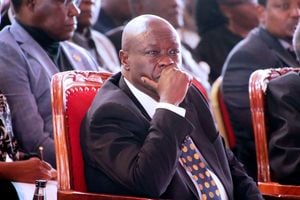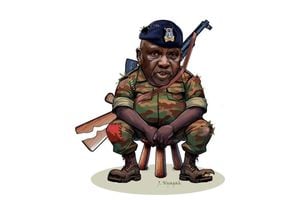Import ban on old buses, trucks good

A new commuter bus on Moi Avenue, Nairobi, on October 19, 2016.
On the matter of the recent import ban on used buses and trucks, the government must stand firm and insist on doing what is, in the long term, in the interest of the economy—the revival of the local motor vehicle assembly.
We used to have a thriving motor vehicle assembly in this country. The rain started beating us in the 1990s, when we uncritically embraced the Washington Consensus that led us into adopting blanket import liberalisation policies.
This is how the country ended up being turned into a ‘mitumba’ (secondhand) economy. Today, we import upwards of 100,000 used cars in a year. Indeed, Kenya ranks among the top destinations for used cars in the world. We have allowed our country to be turned—literally—into an auto graveyard.
The Kenya Bureau of Standards (Kebs) recently published a new standard, called KS 15:15, that has imposed an outright ban on imports of used buses, minibuses and trucks from June 1. But it’s not as if the standards body just woke up one morning and decided to impose the ban.
This issue has been the subject of consultations and discussions with stakeholders for three years. It was during such consultations between motor vehicle assemblers and owners of used car businesses that it was agreed the shift to a policy regime which supports the local motor vehicle assembly industry should start with the banning of imports in the segment of buses and trucks.
Automotive policy
The shift in policy is informed by a fairly well-thought-out national automotive policy, whose centrepiece is revival of local motor vehicle assembly through boosting capacity utilisation rates of the existing assemblers. The three motor vehicle assembly plants in the country have been suffering from crippling capacity utilisation constraints. Should KS 15:15 work, we should see a return of brisk activity not only in the assembly of buses and trucks but also local vehicle component manufacturing.
Indeed, the automotive industry has strong economic linkages through upstream supply chains. We have capacity to manufacture and make paint, exhaust pipes, leaf springs, radiators, batteries, brake lines, disc brakes, windscreens and batteries.
We must all pray that the government resists attempts by the used car import lobby to derail its plans. The group has mounted a campaign against the ban on imports. The way I see it, the lobbying is going to become increasingly intense, especially as we approach the elections. However, the government must stand firm and keep its eyes focused on what is good for economic growth and job creation.
Small closely-knit group
By any yardstick, KS 15:15 is a bold move. You have to muster a great deal of political will to implement such a policy as you will find yourself pitted against a hugely influential and strong importers’ lobby opposed to any policy that proposes import substitution, deeper industrialisation and rationalisation of the industry.
The most influential players in this space are Japan-based Pakistani nationals, which is a small closely knit group with friends in higher places and tentacles in nearly all centres of power. Perennial complaints by local used-car dealers about domination by non-residents and perceived lapses in enforcement of work permit regulations in this sector have been to no avail. The Asians control nearly 80 per cent of the used car business in East Africa.
It doesn’t surprise that implementation of the ban on imports of used trucks and buses has been delayed for almost two years. If you scrutinise the relevant gazette notice, you will realise that it’s dated August 25, 2020. The ban on imports of buses and trucks could have happened several months ago were it not for the political influence of the importers’ lobby.
I predict that the next stage for this high-stakes battle will be the High Court. It should not surprise anyone if we see some freelance public litigation expert moving to court to seek an injunction against the implementation of the ban on used-bus imports.
For Kenya, a drastic change in the policy on used motor vehicle imports has become an imperative on both economic and national security grounds. The national security dimension is a critical issue because we have, perhaps more than any other country in the region, suffered most from terrorist attacks.
We’re always cited as a conduit for money laundering and international drug trafficking. Globally, trade in used cars is suspected to be a vehicle for laundering dirty money. In the United States, several used car dealerships have been investigated for laundering money for terrorist networks in Lebanon.
Admittedly, the dream of a viable, full-blown national automotive industry lies beyond our reach. And, the fact that the liberalised regime has helped many citizens to afford cars cannot be gainsaid. But we must start from somewhere: Policymakers must start thinking about forward- and backward linkages and deepening industrialisation.





